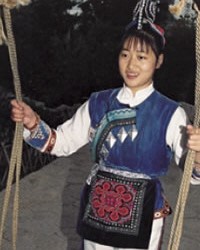The Woni are part of the Hani nationality in China. The Hani are a collection of at least "17 subgroups who speak at least six (and probably closer to 12) mutually unintelligible dialects. ... Each group is characterized by its own identity and tribal costume." An early ethnographer Henry Davies said the Yi mixed with the Mon-Khmer peoples to form the Woni. There is some confusion because the name Woni was also formerly used to describe all Hani in China. The Woni profiled here, however, are a distinct ethnolinguistic group.
Most Woni are impoverished peasants. Their average life expectancy is just 58 years, compared to the high national average of 72 years for members of the Manchu nationality.
The Woni are perceived as shy and distrustful of outsiders. "Despite this, they are noted for their warm, genuine hospitality once one gets to know them. When a guest enters their home, he is offered wine and strong tea. If he declines, the family will be highly offended." The Woni celebrate the New Year Festival: "At noon on New Year's Day, an announcer throws three balls of blackened rice behind him to bid farewell to the old year. He then greets the new year by tossing three balls of white rice in front of him. Next, he pushes the ropes of a special swing and all of the people, regardless of sex or age, begin swinging." The most interesting part of a Woni woman's dress is the long piece of square cloth attached to the turban. "One wonders how comfortable it is ... this woman's annex to the turban."
The Woni venerate the spirits of their parents-in-law. Each year in the second lunar month they hold a grand offering service. The whole village participates in praying to the spirit world for health, prosperity, and an abundant harvest. There is also a strong Christian presence among the Woni.
Woni churches need revival fire and a willingness to follow Christ no matter what the cost.
Pray for the Wonis to become Christ's ambassadors to the unreached tribes of Yunnan Province.
Pray for the Lord to abundantly bless Woni families spiritually and physically.
Pray for the Lord to raise up and thrust out Tuwo disciplers.
Scripture Prayers for the Woni in China.
Operation China, Asia Harvest, Copyrighted Used with permission.
| Profile Source: Joshua Project |










